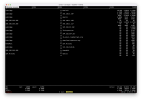The goal post moved a long time ago... But still a pretty informative discussion...What started as a debate on storage medium/technology become digital vs. analog
For 2-ch music playback, a simple spinner HDD or even a flash drive is sufficient. SSD may be overkill for audio.
And USB 2.0 is fast enough for data transfer too.
Cheers,
Raghu
The problem with Streaming is that they tend to employ variable bit rates as per network conditions. Even though it's advertised as Hi-Res but chances are there that the streams fall back to AAC in between, especially at the start of the stream. If you download a track (raw FLAC) from any popular streaming service and then play it locally, you will notice a difference compared to when streamed online.


